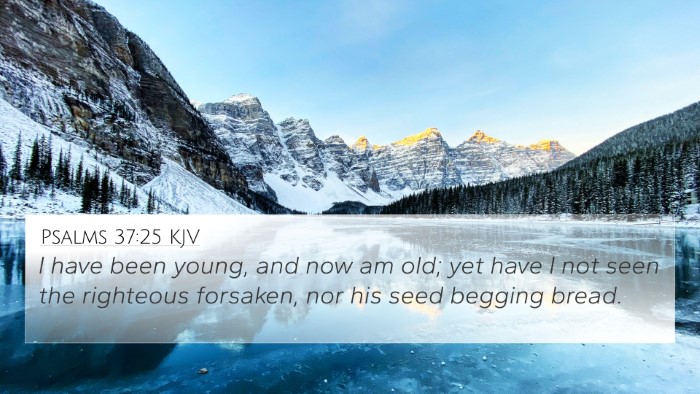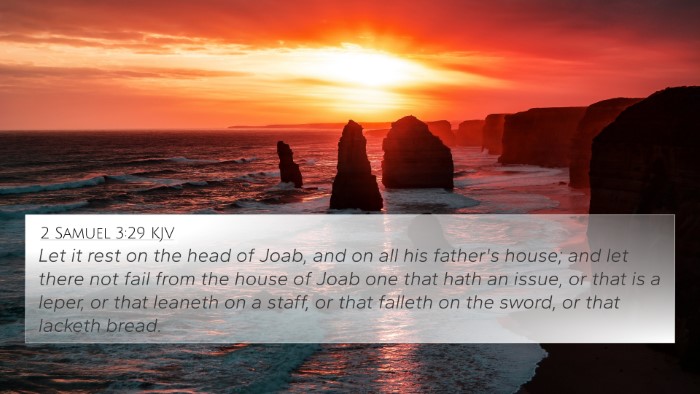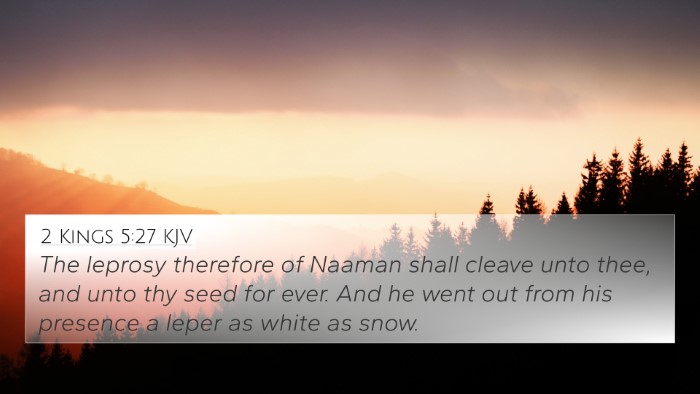Psalms 109:10 states, "Let his children be fatherless, and his wife a widow." This verse offers a challenging and often debated insight into the themes of justice, retribution, and the consequences of human actions. It evokes the gravity of invoking divine retribution upon those who commit acts of wickedness.
In order to glean a deeper understanding of this verse, various public domain commentaries provide valuable insights. Matthew Henry, Albert Barnes, and Adam Clarke each highlight the emotional weight of this verse and its implications regarding the fate of the evildoer’s family.
Commentary Insights
Matthew Henry's Commentary
Matthew Henry emphasizes the dire consequence of wickedness reflected in this verse. He succinctly states that the verse is a form of imprecation directed at the enemies of God’s chosen. The idea here is that the injustice the person has perpetrated will eventually lead to calamity upon his progeny as well. It serves as a sobering reminder of the broader impact of an individual’s moral failings, seeping into their family and lineage.
Albert Barnes' Notes on the Bible
Albert Barnes delves into the character of retribution that this verse signifies. He explains that the psalmist is invoking a curse that reflects the consequences of one’s actions and choices. The lamentation of having children fatherless and wives widowed paints a stark picture of loss and sorrow which should evoke compassion and reflection in the reader. Barnes highlights that the psalmist is rendering a verdict on the unrepentant sinners, prompting readers to consider the moral dimension of God’s judgment.
Adam Clarke's Commentary
Adam Clarke provides a rich context for this verse, interpreting it within the broader narrative of Psalms. Clarke underscores the emotional pain that the psalmist feels as he pleads for justice, suggesting that this verse reverberates with the deep spiritual anguish in the face of evil. He further mentions that such imprecatory prayers serve to heighten the listener's awareness of the gravity of sin and the need for divine justice.
Cross-References
Psalms 109:10 has several biblical parallels and references that enhance its meaning. Some relevant cross-references include:
- Psalms 37:28: "For the Lord loves the just and will not forsake his faithful ones." This speaks to God’s care for righteousness.
- Psalms 5:6: "You destroy those who tell lies; the bloodthirsty and deceitful you, Lord, detest." This correlates with the adversary's fate found in Psalms 109.
- Proverbs 13:22: "A good person leaves an inheritance for their children's children, but a sinner's wealth is stored up for the righteous." This contrasts the fate of the wicked with the righteous.
- Lamentations 5:3: "We are orphans and fatherless, our mothers are widows." This reflects the sorrowing consequences of the sins of men.
- Matthew 23:35: "And so upon you will come all the righteous blood that has been shed on earth." This connects the themes of judgment and blood guilt.
- Mark 11:25: "And when you stand praying, if you hold anything against anyone, forgive them." The verse invites a reflection on forgiveness amidst the calls for justice.
- Romans 2:6: "God 'will repay each person according to what they have done.'" This emphasizes the principle of divine justice.
Thematic Connections and Interpretations
The verse illustrates serious themes of judgment and the long-lasting impact of sin. In light of both justice and mercy, it offers a poignant reminder of human frailty and the weight of one’s legacy.
Thematic Wrapping: It may be important to consider that while Psalms 109:10 addresses harsh realities, it doesn’t end in hopelessness. Instead, it can encourage believers to reflect on the transformative power of repentance and the grace that God extends even amid severe criticisms. Understanding the fate of those who adopt wickedness ultimately pushes one towards a path of righteousness—a theme that resonates throughout scripture.
Conclusion
Psalms 109:10, when examined through the lens of historical and theological perspectives, reveals deep truths about sin, judgment, and the impact of one's actions on families. The commentaries by Henry, Barnes, and Clarke bring clarity to its meaning, while the cross-references help to place this verse in a broader context of scripture. These insights can serve as a valuable resource for anyone studying the gravity of divine justice as outlined in the Psalms.
Engaging with these resources can enhance one’s understanding of Bible verse cross-references, and the connections between Bible verses, allowing for a richer exploration of scriptural themes and their implications in our lives today.










